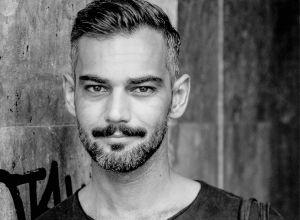For the Greco-German stage director Sarantos Georgios Zervoulakos, settling on theatre was a big step. His motto: defend what you love. Today, he lives and works in Athens and Vienna—two metropolises that, at least at first glance, couldn’t be more different.
Sarantos Georgios Zervoulakos first studied medicine for five years while working on the side as a director’s assistant before he ultimately decided to focus on theatre. “I’d become better acquainted with the professional theatre world by that point, so I did know what I was getting into. And I’ve since come to think that it was the most courageous step I’ve ever taken.”

His passion for the theatre had actually existed since his earliest childhood. Every year, his German grandmother—who had experienced only wartime Christmases as a child—would stage a lovingly detailed, fairy tale-like Christmas celebration for her grandson. Sarantos was the only member of the family who was allowed to be part of his grandmother’s preparations “backstage”, thus experiencing first-hand the joy that preparing such things can evoke. It was “my first go at being a director’s assistant”—at age five.
Sarantos, born in Thessaloniki, Greece in 1980, spent his childhood in Germany. He gathered some initial stage experience while still at school, learning early on how it is to work together with others on a production. The young director now remembers this as having had a great impact.
Following his eventual decision to go into theatre, Sarantos’s first choice was the Max Reinhardt Seminar. He’d learned from various sources that this mdw department’s training model included clearly defined collaboration between acting and directing majors, thereby offering a special opportunity to familiarise oneself up close and personal with acting and actors as such. “The fact that working together with actors had always been at the centre of my interests was one of the main reasons why I applied to the Seminar.” Once he’d passed the entrance exams, it took but a single week for the freshly minted directing student to pack his bags and move to Vienna.
In actual fact, the constant exchange with acting students did indeed turn out to be an important impulse behind the work he’s ended up doing—with ideas for plays, casting, and projects arising from moments of collaboration with others. Sarantos compiles his own personal mosaic of inspiration based on such encounters. And he’s interested in the mistakes made by his role models—especially when they’re willing to discuss their mistakes openly, “because it’s then that you truly can learn something from them,” he explains. What he’s not interested in doing is blindly worshipping this or that idol.
Sarantos Georgios Zervoulakos describes his initial steps into professional life as having been very intense, with multiple challenges and lots of things to be learned. Even so, 2011 already saw him nominated for a Nestroy Theatre Award in the “Best Young Artist” category for his production of Eine Sommernacht (Orig.: Midsummer – A Play with Songs) by David Greig and Gordon McIntyre at the Burgtheater’s “Vestibül” venue. That was followed one year later by a mention in the “Best Young Artist” category of the magazine Theater heute along with numerous jobs at renowned institutions such as the Residenztheater in Munich and the Schauspielhaus in Graz.
A special moment during the past ten years, says the director, was his professional step from the German theatre scene into the theatrical world of Greece. In doing so, the store of experiences and “tools” he’d acquired in a German-speaking context were translated into his second mother tongue—a process that he experienced both as an adventure and as a source of great joy.
It was around seven years ago that Sarantos ultimately developed his initial idea for a format that he ended up calling Eteria Filon (which translates as “Society of Friends”). In this context, he’s been working since 2016 to realise international and interdisciplinary theatre projects with a special focus on the integration of German- and Greek-speaking artists, thereby overcoming linguistic hurdles. “My fundamental concern was and still is to provide an artistic answer to the reality of life in today’s Europe. I grew up in a multilingual family environment. So to me, living together with people from various backgrounds has a lot to do with the reality of life in Europe. That’s what I’d like to tell people about. And I think that multilingualism, which embodies a reflection of contemporary society, is still underrepresented onstage at the theatre.”
To this exceptional stage director, diversity is of great importance and represents a crucial source of inspiration. “In the environments in which my various productions place me, I find a special, personal way of approaching my own works. And if I want to say something about an international, integrated, diverse society—and indeed I do!—I need such environments all the more.
Zervoulakos’s current project, the stage version of the Austrian cinematic film Die Migrantigen, is currently being hosted by the Theater in der Josefstadt at its “Kammerspiele” venue. And afterwards, he’ll be continuing on to his next production in Athens. “Vienna is and will remain my artistic home. But I find it highly stimulating to rediscover my Greek home [in Athens] in the context of my works for the stage. It’s the contrasts between these two cities that inspire me.” Ultimately, however, this artist perceives theatre as being something like a country all its own, one in which he can feel at home no matter where in the world he is.

